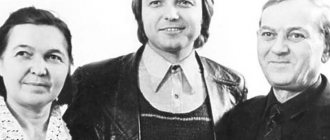Parents
Magomaev Muslim Magometovich, whose biography interests many, was born in 1942, on August 17, in the city of Baku. His father, Magomet Magomayev, worked as a theater artist and died at the front fifteen days before the Victory. The future singer’s mother, Aishet Magomayeva, was a dramatic actress and Stalinist scholarship recipient. She performed on stage under the creative pseudonym Kinzhalova. The boy’s grandfather, Abdul-Muslim Magomayev, is a famous composer in Azerbaijan. The Azerbaijan State Philharmonic Society bears the name of this talented person. Thus, the biography of Muslim Magomayev has been connected with creativity since birth.
Biography of Muslim Magomayev
Childhood and school years
The famous pop singer was born into a talented family. Therefore, his childhood passed in a creative environment. Det Muslim Magomayev was a great man and became famous for his activities as a conductor and composer. The singer's mother found herself on the theater stage. The dramatic actress played complex roles and always found her audience. It was difficult to find empty seats at performances with her participation. Muslim's father found himself as an artist at a young age. Over time, he acquired the profession of a decorator.
Unfortunately, Muslim Magomayev had very little opportunity to be with his father. The period of his childhood fell on military operations. There was very little time left before the end of the war when news of the death of Mohammed arrived at the artist’s house. After the tragedy, the boy was raised for some time by his father's brother. Muslim learned a lot from his uncle. His upbringing was patriotic, thanks to which the boy so reverently fell in love with compositions dedicated to his homeland.
Muslim studied at a music school, where teachers immediately noted the uniqueness of his voice and even then predicted a great future in a creative environment. When the boy was nine years old, he began to live with his mother in a small Russian town. At first, he really missed his homeland. Russia differed in nature and weather from Baku. Muslim spent a lot of time with his mother at work. The theater stage and its backstage became practically the boy’s second home. At the same time, he did not forget about his main joy in life - music.
As a child, Muslim Magomayev did not live long in Russia. Upon returning to Baku, the guy plunged completely into creativity. He listened to music for hours and studied a lot. But the basic disciplines were difficult for Muslim, or rather, he simply did not want to devote much time to them.
Youth and youth
When the pop singer Muslim Magomayev turned 14 years old, guides through his creative life began to appear in his life. At that time, he just entered the music school named after. Asafa Zeynaly. Within the walls of the institution, fate brought Muslim together with famous vocalists and accompanists. Magomayev grew up in the musical field every day. At the age of 17, the young man was educated at a music school. Just two years after this, Muslim became the soloist of the ensemble in Baku and a series of tours began in his life.
Nationality
The mother of the future celebrity had Russian, Adyghe, and also (on her father’s side) Turkish roots and was a very beautiful woman. The boy’s grandmother on his father’s side was a Tatar by nationality; no one knows the origin of her husband. Muslim Magometovich himself always called himself an Azerbaijani and asserted: “Azerbaijan is my father, Russia is my mother.”
Childhood
After the death of her husband, Aishet Magomayeva chose an acting career and moved to Vyshny Volochek, and then to Murmansk, where she joined the local theater and got married again. After this, Muslim had a sister, Tanya, and a brother, Yuri. After the end of the war, the future singer lived with his uncle, Magomayev Jamal Muslimovich. The boy attended a music school at the Baku Conservatory, where he mastered playing the piano and the basics of composition. The talented student was noticed by the conservatory professor V.Ts. Anshelevich. He began to study with Muslim, taught him to finesse his unique voice. These lessons were later very useful to the singer while working on the role of Figaro in the famous “The Barber of Siberia.”
The music school the boy went to did not have a vocal department, so in 1956 the biography of Muslim Magomayev was marked by a new event: he became a student at the Baku Music College named after Zeynalli Asaf. He had the opportunity to study with teacher A. A. Milovanov and accompanist T. I. Kreiting. Muslim graduated from the educational institution in 1959.
Rumors and truth about the life of Muslim Magomayev
All-Union fame fell on the singer in his early twenties. Moreover, the term “glory” in this case should be understood not only from applauding halls, but also all the signs of idolatry so unnatural for secular morals. They were ready to carry the singer, and sometimes the cars in which he tried to leave after the concert, in their arms; they wanted to touch Muslim and even tear off a piece of his clothing. It is not surprising that the artist instantly developed a reputation as a spoiled idol. They talked about incredible incomes and even about a strange habit from time to time of throwing money directly into the crowd from hotel balconies.
Muslim Magometovich himself laughed at such speculation in rare interviews, but did not deny that he loved generous gestures. For a long time, the artist did not have his own home in Moscow, so he rented a huge five-room suite at the Rossiya Hotel, where he liked to gather friends and hold banquets for fifty people. In addition, in this room, which was usually not locked, there was always money that Muslim’s many friends could borrow.
It was money that once became the reason for calling the singer to the department for combating the theft of socialist property. This happened after the artist was paid a triple fee, that is, about six hundred rubles, for a concert at a 45,000-seat stadium in Rostov, which at that time seemed the height of financial promiscuity. There was no criminal case, but for some time Magomayev was allowed to perform only in Azerbaijan. This kind of exile lasted for about a year, but when KGB chief Yuri Andropov demanded the artist’s presence at the festive concert of his department, all bans were immediately lifted.
The sympathy that various important people felt for Muslim Magometovich often brought certain dividends, including creative ones. For example, Leonid Brezhnev was very fond of the Italian “Bella Ciao” performed by Magomayev and, of course, the singer was forgiven for some other repertoire liberties of an ideologically controversial nature: from songs by Frank Sinatra and The Beatles to hits from popular Hollywood films.
The story of Magomayev’s speech before the Iranian Shah Mohammad Reza Pahlavi has acquired fascinating details. According to rumors, the singer refused to take a fee for performing in the ruler’s palace, and the Shah gave the star from the USSR a luxurious carpet and his ring. The jewel was almost arrested at the border, and only the presence of a representative of the Iranian embassy at the airport helped the artist smuggle in expensive gifts. By the way, Muslim Magometovich wore the ring almost all the time and said that it brought good luck several times.
Everyone who in one way or another crossed paths with Muslim Magomayev claims that already at the Baku music school, the future famous singer literally swam in an ocean of female attention. At the age of eighteen, student Magomaev married his fellow student Ophelia Valieva, a little later they had a daughter, Marina, but this did not save the marriage. At that time, there was no yellow press in the Soviet Union yet, so it is quite difficult to get a clear idea of how the personal life of the country’s favorite was going. However, in the late sixties, Muslim met the young opera singer Tamara Sinyavskaya, and this meeting became the beginning of a new life for the superstar.
If we proceed from common sense, then for such a couple the chances of a normal relationship tended to zero. Sinyavskaya was married, Magomayev lived in a civil marriage, and if we add to this difficult schedules and a serious artistic ego, then conversations about some kind of future looked very strained. However, the lovers were able to overcome almost all the inevitable obstacles: from violent quarrels to separations and rumors of an imminent divorce.
By modern standards, Magomayev left the stage quite early, not wanting to disappoint the audience with problems with his voice. Perhaps that is why he remained for his fans forever young, energetic and completely irresistible representative of the era when artists were big.
First successes
The creative biography of Muslim Magomayev the singer began in 1957 in the city of Baku, where, secretly from his family, he performed on the stage of the House of Culture of Baku sailors. The boy's relatives were afraid that the fifteen-year-old performer could damage his unique voice with excessive stress. However, Muslim was sure that his vocals were already fully formed. Four years later, the singer began performing as part of the professional Song and Dance Ensemble at the Baku Military District. In 1962, Magomayev became a laureate of the International Festival of Youth and Students in Helsinki, where he performed the song “Buchenwald Alarm”. The whole country recognized the singer after his performance on the stage of the Kremlin Palace of Congresses in 1962, during the final concert of the Azerbaijani art festival. The young artist shocked the audience not only with his unique voice, but also with his extraordinary appearance. Its popularity began to quickly gain momentum.
Career development
The singer's first solo concert took place in 1963, on November 10, on the stage of the Tchaikovsky Concert Hall. The performance was a great success. In the same year, the biography of Muslim Magomayev was decorated with a new important event: he became a soloist of the Azerbaijan Opera and Ballet Theater named after Akhundov. At the same time, the artist continued to perform pop compositions.
In 1964-1965, the talented vocalist was sent for an internship at the Italian theater La Scala (Milan). In the 1960s, Magomayev actively toured the USSR, performing in the largest cities of the country in the plays “The Barber of Seville” and “Tosca.” The singer was offered to join the Bolshoi Theater troupe, but he refused because he did not want to limit his repertoire to the performance of classical arias.
Creative path
The family was very worried that Muslim would not lose his divine voice as a teenager, so they were against his early concerts on stage. But the young man himself had a different opinion, and at the age of 15, his first performance took place on the stage of the House of Culture of Baku Sailors. Muslim managed to avoid teenage vocal withdrawal.
In 1961, he made his debut in the song and dance ensemble of the Baku Military District, after which he began a tour of Transcaucasia.
A year later, he became part of the USSR delegation and went to Helsinki, where, after performing the musical composition “Buchenwald Alarm,” he won the World Festival of Youth and Students.
In the same 1962, a festival of Azerbaijani art was held in the Kremlin Palace of Congresses, and Muslim also sang during the final concert. After this speech, he learned what all-Union glory was. Variety concert activity began, but it did not prevent the singer from becoming a soloist of the Azerbaijan Opera and Ballet Theater in 1963. In 1964-1965, Muslim trained in the Italian city of Milan at the La Scala theater.
Returning from Italy, Magomayev and his partner Maria Bieshu toured the largest cities of the Soviet Union with the performances “The Barber of Seville” and “Tosca”. Soon Muslim was offered to join the Bolshoi Theater troupe, but he refused, since the young singer did not want to limit himself to opera performances.
In 1966 and 1969, Muslim's tour in Paris was a resounding success; he performed at the famous Olympia Theater. After these tours, the director of the Paris Theater offered Magomayev an annual contract. The singer became interested in this proposal, but was refused by the USSR Ministry of Culture. In Paris, Muslim was even offered to emigrate, but in this case he refused, since he could not imagine his life away from his homeland.
The singer's records sold millions of copies; his repertoire included, in addition to pop songs and opera arias, popular hits by foreign composers and Russian romances. His international prizes and awards alternated with domestic ones:
- 1st prize at the International Festival in Sopot (1969);
- "Golden Disc" in Cannes at the International Recording Festival (1969 and 1970);
- People's Artist of the Azerbaijan SSR (1971);
- People's Artist of the USSR (1973).
In 1975, Muslim created the state pop-symphony orchestra in Azerbaijan, with which he began an endless series of tours. They wanted to see and hear Magomayev in every corner of the Soviet Union and far beyond the country's borders. Thousands of stadiums and concert venues attracted his concerts in France, Iran, Bulgaria, Canada, Germany, Finland, and Poland. For 14 years, Muslim led the orchestra he created.
For several decades, not a single government concert or holiday program on television was complete without Magomayev. The whole country knew and sang his pop compositions:
- "Azerbaijan";
- "Ferris wheel";
- "Bella Ciao";
- "Wedding";
- "Thank you";
- "Huge Sky";
- "Give me back the music";
- “We cannot live without each other”;
- "Melody";
- "The best city on earth";
- "Queen of beauty";
- "Voice of the Earth".
Temporary difficulties
The biography of Muslim Magomayev is associated with constant success. From a young age he was revered and loved. The official authorities favored the singer in every possible way; he was constantly sent on tours abroad, where he captivated the enthusiastic public with his talent. So, in 1966 and 1969, Muslim Magometovich performed on the stage of the Olympia Theater in Paris. However, even this favorite of fortune was overtaken by temporary difficulties. The director of the theater, Bruno Cockatrice, offered the talented artist an annual contract, intending to make him a world-famous star. However, the USSR Ministry of Culture did not like this idea. Magomayev started having problems in his homeland—the OBKhSS became interested in his earnings. The news about the initiation of a criminal case found the singer in Paris. Local emigrant circles tried their best to persuade the artist to stay in France, but he could not imagine his life away from Russia and chose to return. The USSR Ministry of Culture temporarily banned Muslim from performing outside Azerbaijan. The artist took advantage of his free time and graduated from the Baku Conservatory in vocal class in 1968.
Peak of popularity
After temporary oblivion, Magomayev became famous again. In 1969 he won first prize at the International Festival in Sopot. In 1968 and 1970 he received the Golden Disc award at Cannes. In 1973, the creative biography of Muslim Magomayev reached a new level: the singer was awarded the title “People’s Artist of the USSR.” For many years (from 1975 to 1989), the vocalist was the artistic director of the Azerbaijan State Symphony Orchestra, with which he toured the Soviet Union several times. The artist's popularity in the 1970s was truly limitless. His records sold in huge quantities; even today he remains an unsurpassed idol for many people living in the post-Soviet space. The singer's repertoire includes more than six hundred works, including arias, romances, and pop songs.
Family and children of Muslim Magomayev
The family and children of Muslim Magomayev fought for several years for the inheritance left after his death.
The family of the popular performer lived in the Azerbaijani capital. It was here that a baby named Muslim was born.
The artist was proud of his loved ones. Muslim was named in honor of his paternal grandfather, who was a creative person. He wrote music and led a local orchestra.
The father of the great artist was a talented Baku artist named Mohammed. The boy didn't remember his dad. He died a few days before the victory over Nazi Germany.
Magomaev very much loved and appreciated his mother, who was a talented singer and dancer. The woman played in drama theater productions for many years. After the death of her first husband, she was alone for several years. Then, having met a new love, she married a second time. The marriage produced a brother and sister of the great tenor.
Our hero was very proud of his uncle, who raised the boy as his son after the death of his brother. It was Jamal Muslimovich who contributed to his nephew becoming a creative person.
According to official data, the popular pop singer had only one daughter, whom his first wife Ophelia gave birth to.
Just before the death of Muslim Magomayev, articles appeared in the press that the artist was also the father of a son. The boy lived in the United States of America. The popular performer himself admitted the fact of his relationship with Daniel’s mother, but did not admit that it was from him that he was born. After the great performer passed away, Daniel Figotin came to Russia and Azerbaijan. He visited the artist's grave. But information about the relationship between Muslim Magomayev and his pseudo-son is unknown to the general public.
Recently, a young girl stated that she was born as a result of her mother's relationship with the artist. But DNA testing refuted these claims.
Last years
In 1998, the artist left his creative activity and settled with his family in Moscow. Being a sensitive person, he understood that he needed to leave the stage on time and with dignity. Muslim Magomaev was engaged in painting and carried on lively correspondence via the Internet with fans in recent years. The singer’s biography and cause of death still concern numerous admirers of his talent. According to friends, the performer suffered from heart and lung disease, but did not know how to take care of himself at all - he could smoke three packs of cigarettes in a day. One of the artist’s last songs was the composition “Farewell, Baku,” recorded in 2007. Muslim Magomaev died in 2008, October 25, at the age of sixty-six. The biography and cause of death of the singer is not a secret to anyone. The singer died of coronary heart disease.
Personal life
The artist was married twice. In 1960, he married a girl named Ophelia. Muslim Magomayev, biography, his children have always been the subject of discussion among the people. The singer’s first marriage broke up a year later, but his wife managed to give him a daughter. The girl was named Marina. This is the singer's only child. Currently lives in the United States with her husband and is raising a son named Allen, daughter of Muslim Magomayev
The singer's biography in 1974, November 23, was marked by remarriage. He married Tamara Ilyinichna Sinyavskaya, a singer and People's Artist of the USSR. Muslim Magomedovich lived with her until his death.
This is the biography of Muslim Magomayev. His life's journey was unforgettable and vibrant. He became a symbol of an entire generation and still lives in the memory of his many fans.
Family
Dad - Magomet Magomayev (1916-1945), theater artist, died at the front 15 days before the Victory, mother - Aishet Magomayeva (1921-2003) (stage name - Kinzhalova), dramatic actress, Stalinist scholarship recipient.
His paternal grandfather is Abdul-Muslim Magomayev, an Azerbaijani composer, whose name the Azerbaijan State Philharmonic Society bears, and is one of the founders of Azerbaijani classical music. About the origin of his mother, Aishet Akhmedovna, Muslim Magomayev wrote that she was born in Maykop, her father was Turkish by nationality, and her mother was half Adyghe, half Russian. About the origin of his father, he said that his mother was a Tatar (his grandmother Bagdagul-Jamal was the sister of Ali and Hanafi Teregulov), and it is unknown who the ancestors of his father were by origin. In the documents, Magomed Magomayev is an Azerbaijani by nationality. Muslim Magomayev himself always considered himself an Azerbaijani, and about his citizenship he said: “Azerbaijan is my father, Russia is my mother.”
The mother, having lost her husband, chose a theatrical career, leaving for Vyshny Volochyok, then to Murmansk, where she worked in the regional drama theater and got married again. On his mother's side, Muslim has a brother, Yuri, and a sister, Tatyana.
The first wife is Ophelia Velieva (born 1940), a classmate at the Baku Music School. The marriage lasted until 1963.
Daughter from his first marriage - Marina. Marina currently lives in the USA, in Cincinnati, with her family - her husband Alik (Alexander) Kozlovsky, the son of Muslim's close friend Gennady Kozlovsky, and son Allen Maxwell.
The second wife is Tamara Ilyinichna Sinyavskaya (born 1943), singer, People's Artist of the USSR (1982), their romance began in Baku in the fall of 1972, they got married on November 23, 1974 in Moscow, Tair Salakhov played a big role in this.










